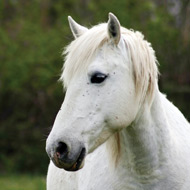Vets asked for information on EK

AHT hopes to find out why some horses are more susceptible to EK.
Vets are being asked to share information on recent cases of eosinophilic keratitis (EK), to inform research being carried out by the Animal Health Trust (AHT).
EK is an emerging opthalmology issue in the UK and despite increased awareness of the disease worldwide, its cause is still poorly understood.
AHT is investigating the root cause of EK and hopes to find out why some horses are more susceptible than others. In particular, researchers will be looking at epidemiological links, environmental factors and parasitic infestation.
A number of the clinical signs of EK are non-specific and similar to those seen with other conditions of the cornea - for example, blepharospasm, chemosis, conjunctival hyperaemia, epiphora or perilesional oedema.
Some of the more specific signs include caseous mucoid discharge and white/yellow plaques. These are often localised in the peripheral cornea. Conjunctivitis may also occur.
Pain levels vary and concurrent ulceration is almost always present.
Clinical presentations can also vary, from a thick caseous accumulation to a superficial plaque of 'ground-glass' appearance.
Patients may be presented with chronic non-healing ulcers that respond well to topical steroids and/or ciclosporin. Others may present with marked ocular discomfort - in which case superficial keratectomy may be required to resolve the condition.
Typically (though not exclusively), two corneal locations are involved with EK - the medial perilimbal cornea, often under the third eyelid, or the lateral perilimbal cornea, which may progress towards the central cornea.
In addition to this research, AHT is offering free cytology tests for corneal scrapes to help diagnose the condition earlier, thereby avoiding secondary complications that may lead to permanent visual impairment.
If you have seen either diagnosed or suspect cases of EK this year, contact Sonia Gonzalez-Medina on 01638 751000 ext. 1203, or sonia.gonzalez-medina@aht.org.uk.
For further information or a copy of the form to submit with samples, visit www.aht.org.uk/EKstudy



 The Federation of Independent Veterinary Practices (FIVP) has announced a third season of its podcast, Practice Matters.
The Federation of Independent Veterinary Practices (FIVP) has announced a third season of its podcast, Practice Matters.